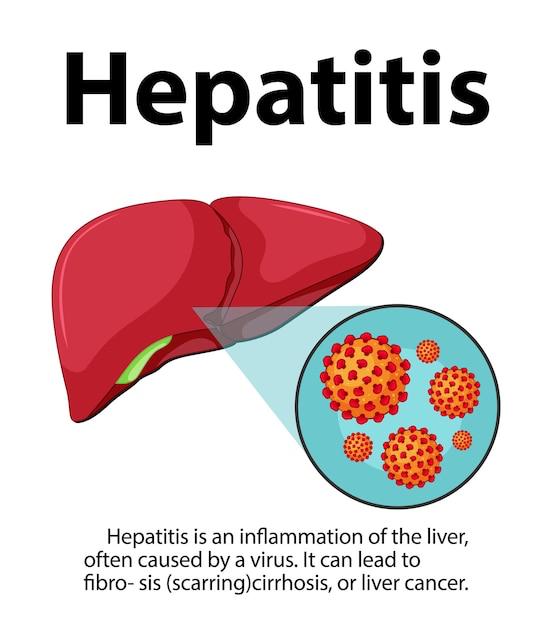
Inflammation of the liver, a vital organ responsible for several functions such as detoxification, protein synthesis, and digestion. There are different forms of hepatitis, each of which has different causes, symptoms, and treatments. This blog will discuss the types of hepatitis, their causes, symptoms, prevention methods, and treatment options.
Types of Hepatitis
Hepatitis A
- Cause: Hepatitis A virus (HAV), spread primarily through contaminated food and water
- Symptoms: Fatigue, nausea, abdominal pain, loss of appetite, and jaundice.
- Prevention: Vaccination, good hygiene practices, and safe food handling.
- Treatment: Often resolves on its own; rest, hydration, and adequate nutrition are recommended
Hepatitis B
- Cause: Hepatitis B virus (HBV), spread through contact with infectious body fluids such as blood and semen.
- Symptoms: Similar to hepatitis A but can become chronic, leading to liver cirrhosis or liver cancer.
- Prevention: Vaccination, avoiding sharing needles, practicing safe sex, and ensuring safe blood transfusions.
- Treatment: Antiviral medications for chronic cases; acute cases often resolve on their own.
Hepatitis C
- Cause: Hepatitis C virus (HCV), spread primarily through blood-to-blood contact.
- Symptoms: Often asymptomatic in the early stages; chronic infection can lead to liver cirrhosis and cancer.
- Prevention: No vaccine available; avoid sharing needles and ensure safe medical practices.
- Treatment: Antiviral medications, many patients are recovering through new treatments.
Hepatitis D
- Cause: Hepatitis D virus (HDV), which occurs only in people infected with HBV.
- Symptoms: Similar to hepatitis B but more severe.
- Prevention: HBV vaccination prevents HDV infection.
- Treatment: No specific antiviral treatment; management focuses on controlling HBV infection.
Hepatitis E
- Cause: Hepatitis E virus (HEV), spread through contaminated water.
- Symptoms: Similar to hepatitis A, usually acute and self-limited.
- Prevention: Good hygiene and safe drinking water.
- Treatment: Usually resolves on its own; supportive care includes rest and hydration.
Non – Viral Hepatitis
Autoimmune Hepatitis
- Cause: Immune system attacks liver cells.
- Symptoms: Fatigue, abdominal pain, joint pain and jaundice.
- Treatment: Immunosuppressant drugs to reduce immune system activity.
Alcoholic Hepatitis
- Cause: Excessive alcohol consumption.
- Symptoms: Jaundice, abdominal pain and liver failure.
- Treatment: Abstinence from alcohol, nutritional support and drugs to reduce liver inflammation.
Non – Alcoholic Steatohepatitis {NASH}
- Cause: Buildup of fat in the liver that is not related to alcohol consumption.
- Symptoms: Often asymptomatic; can progress to cirrhosis and liver failure.
- Treatment: Lifestyle changes, including diet and exercise; management of associated conditions such as diabetes and obesity.
Preventing Hepatitis
- Hygiene: Regular hand washing and consuming safe food and water helps prevent hepatitis A and E.
- Safe behaviour: Avoid sharing needles, practice safe sex and ensure safe blood transfusions to prevent hepatitis B and C.
- Regular check-ups: For people at risk, regular medical check-ups can help detect hepatitis early.
Living With Hepatitis
Living with hepatitis requires careful management and regular medical follow-up. Here are some tips:
- Medical compliance: Follow prescribed treatments and attend regular check-ups.
- Healthy lifestyle: Maintain a balanced diet, exercise regularly, avoid alcohol and liver-damaging substances.
- Support system: Seek help from healthcare professionals, support groups and counselling if needed.
Conclusion
Hepatitis is a complex condition with many types, each of which requires specific preventive and treatment strategies. Awareness, vaccination and safe behaviours are important in combating the spread of hepatitis. Early identification and proper medical care can greatly improve the quality of life of those affected, reducing the risk of severe liver damage and other complications. By staying informed and proactive, we can all contribute to a world with fewer hepatitis-related health problems